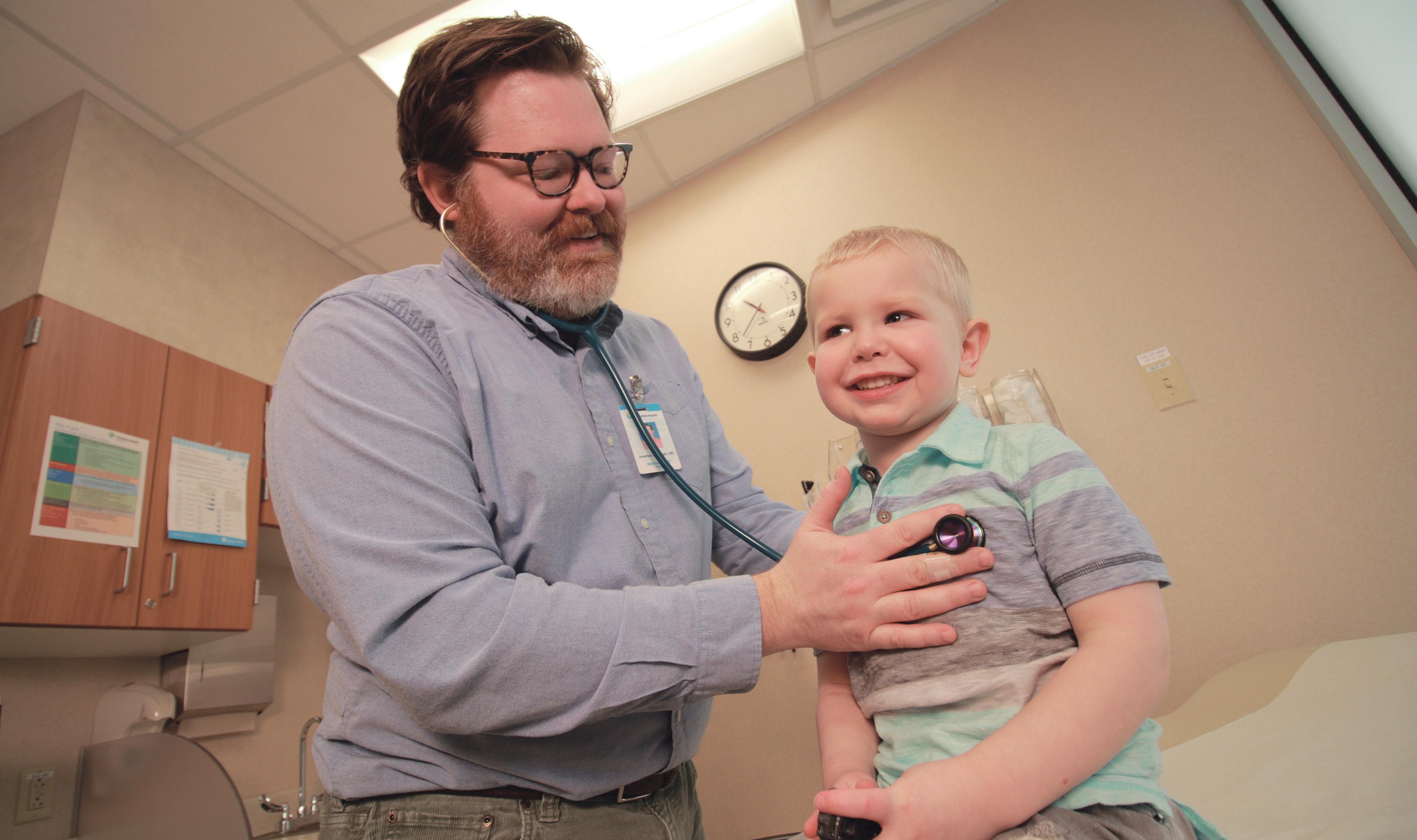
3 minute read
Family Health Well-child visit offers more than a physical exam
BY CONNIE WIRTA
Awell-child visit is more than a complete physical examination by a doctor.
“The essence of a well visit is not just checking that a child is physically healthy,” says Dr. Jonathan KenKnight, a pediatrician at the Essentia Health-Duluth Clinic. “It’s so much more.”
The appointment is a check on your child’s growth and development as well as his behavior and mental health. It’s a chance to ask questions and get advice on issues you face as a parent. The regular visits become an opportunity for both you and your child to build a trusting relationship with a pediatrician or family medicine physician.
“Parents often ask ‘Is this normal?’ or say, ‘Here’s what I think is going on,’ and they’re most often right,” Dr. KenKnight says, explaining parents know their children best.
Well-baby visits are important because they closely follow an infant’s early growth and development and make sure everything is going like it should, Dr. KenKnight explains. “The primary role is to help identify any problems but we also help guide parents,” he says.
A good example is sleep, one of the biggest issues new parents face. “We ask how a baby is sleeping and if there’s a sleep schedule,” Dr. KenKnight says. “We talk about how to get a baby to sleep and how to make sure the family is using safe infant sleep.”
Safe infant sleep, the pediatrician explains, means a baby always sleeps on his back, on a firm surface in a crib or bassinet free of any clutter, such as blankets, bumpers or toys. An infant should sleep in a parent’s room for up to a year, but not share their bed.
Regular visits keep babies on track for important vaccinations that help keep them healthy. It also helps later, when day care and schools require proof of immunizations to enroll. “Sometimes parents come in with preconceived notions about vaccines that aren’t based on science,” Dr. KenKnight says. “I like to share what I know and what science shows us.”
Regular annual checkups begin at age 3. Tracking growth and development also means checking in on healthy eating, physical activity and safety. Building on a trusting relationship becomes even more important as Dr. KenKnight watches for issues at school, such as bullying, or mental health issues, such as stress, anxiety and depression. “Building trust is one of the most important and rewarding parts of being a pediatrician,” Dr. KenKnight says. “I like to get to know a family and see a child’s personality at a young age. Once they get over the fear and anxiety that’s normal from 9 to 18 months, they start to recognize me. I get to talk to children at their level and enter into a conversation with them.”
Another advantage of regular visits comes when a child gets ill and needs an appointment. Dr. KenKnight and the health care team already know the child and the child knows them. “Having a relationship helps me pick up the subtle things,” the pediatrician points out.
Throughout childhood and school ages, Dr. KenKnight talks with children and their parents about mental health concerns such as anxiety and depression. A standardized questionnaire also helps screen children and pick up on potential problems.
Dr. KenKnight says he sees a growing number of children affected by stress and their use of social media. “I see it starting when they get their smartphones, usually in middle school,” he says. “Social media can be isolating. I talk to kids about their media use and how to maintain healthy relationships with people and not just through social media.”
For teens, a physician can become another caring adult that they can rely on. “I encourage teenagers to be empowered by their emerging independence and responsibility,” Dr. KenKnight says. “I can be another source of good information, especially if they’re afraid to talk to their parents on topics like sexuality or mental health. I listen and advise them on making good and healthy choices.”

Connie Wirta is an editor for Essentia Health marketing.
Well Visits
Most insurance companies cover well visits for babies and children, but check with your insurance provider. At Essentia Health, here are the ages recommended for well-baby and wellchild appointments:
• 2-5 days old
• 2 weeks
• 2 months
• 4 months
• 6 months
• 9 months
• 12 months
• 15 months
• 18 months
• 24 months (2 years)
• 30 months (2½ years)
Ages 3-21: Annual checkup
Make An Appointment
To make an appointment with a pediatrician at the Essentia Health-Duluth Clinic, call (218) 786-3400. For a family medicine physician near you, call (218) 786-3107.











